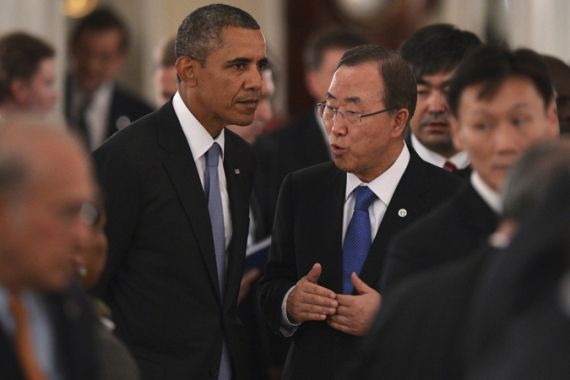UN chief warns against strikes on Syria
Ban Ki-moon says that military action against Syria could lead to a worsening of sectarian violence in the country.

UN chief Ban Ki-moon has made an impassioned plea against military action in Syria, warning that it could spark further sectarian violence in a country already suffering from a humanitarian crisis “unprecedented” in recent history.
Speaking at a humanitarian meeting hosted by Britain on the sidelines of the G20 summit on Friday, Ban called on world powers to put aside their differences over the Syrian conflict, and to take concerted action to get desperately needed aid to the population.
“I must warn that ill-considered military action could cause serious and tragic consequences, and with an increased threat of further sectarian violence,” Ban said.
About a third of Syria’s pre-war 20.8 million population has fled abroad or have been forced from their homes during the uprising against President Bashar al-Assad’s regime which is now in its third year, UN refugee agency data showed.
“This is a humanitarian crisis of unprecedented proportions in recent history,” Ban said.
But “as some flee the country, others dig in to fight,” Ban said, pointing to the need therefore to “avoid further militarisation of the conflict and revitalise the search for a political settlement instead.”
With a political solution proving elusive as world leaders dig in their heels over their entrenched positions, Ban called for unity in securing humanitarian aid for the population.
Food aid shortage
A funding shortage was also threatening to leave refugees in neighbouring countries with no food, he said, adding that stocks would run out within days in Lebanon and within two weeks in Jordan.
“The world must do everything within its powers to stop the suffering of the Syrian people. Let us use this united recognition of the problem as our starting point for focused and positive action,” he said.
“Your support in exercising leverage on all parties to facilitate humanitarian access is critical.”
On Thursday, the UN refugee agency said that from October, it will have to cut food aid to more than a quarter of Syrian refugees in Lebanon.
From October, UNHCR will move to “targeted assistance,” as it struggles to assist a refugee population of at least 720,000 people in Lebanon.
“We will have to switch to targeted assistance and cut some of our direct funding in part because of the shortfall in funds,” UNHCR spokeswoman Roberta Russo said.
“Our campaign sought $1.7 billion for Lebanon, and that is only 27 percent funded,” she added, saying aid agencies were making “difficult decisions” every day about how to use limited aid money.
Russo said a transition from blanket assistance of all refugees to a focus on the most vulnerable was not unusual when dealing with such a crisis.
“At the beginning of the emergency it is normal to give blanket assistance,” she said.
“Then once you have a better knowledge of the population, as we do now, we are better able to distinguish between those who are able to survive without assistance and those who really cannot.”
But she acknowledged that the decision to cut food assistance, which will affect around 200,000 refugees, 28 percent of those in Lebanon, was also driven by the agency’s lack of funds.
“If we don’t have an increase in funding we will not be able to meet, in general, even the needs of population we have now, not to mention the additional population that could arrive if the fighting intensifies.”